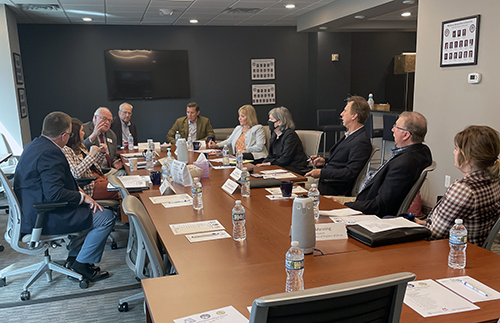State budget director added as conference keynoter

Harkins
Chris Harkins, director of the Michigan State Budget Office, will deliver a keynote address on Tuesday, April 25 at the 2023 Michigan Counties Legislative Conference.
Harkins is expected to give an overview of the Michigan budget situation for fiscal year 2024, respond to a variety of topics posed by MAC staff and take questions from the conference audience.
To learn more about Harkins and all of the conference speakers, click here.
Registration continues for the three-day conference, but members are urged to act quickly, as online registration winds down on April 19. (On-site registration from April 24-26 will be available.)
Other sessions and events not to miss at this year’s conference include:
- A discussion with the Legislative Leadership led by MAC’s director of governmental affairs, Deena Bosworth
- “A National Perspective on the County Landscape and Priorities” by Matt Chase, executive director of the National Association of Counties
- A MAC Legislative Update from MAC’s Governmental Affairs staff
- A State of MAC report from MAC Executive Director Stephan Currie
- Remarks from MAC President Stan Ponstein of Kent County
- A Legislative Reception on the evening of Tuesday, April 25, during which MAC will present its County Advocate Awards for legislative service in 2022.
HOTEL UPDATE: The main conference hotel is now SOLD OUT. If you still need a room, we recommend contacting the Marriott Courtyard in downtown Lansing (approximately 2 blocks from the Lansing Center) at 517-367-6677.
Click here to register.
See conference agenda.
For additional details on hotel rooms, registration pricing, parking and more, visit the conference page on MAC’s website.
MAC-led coalition helps delay changes on mineral brine rules
 New, stricter rules on acquiring and using mineral brine on roadways were delayed by the state after a group of legislators and stakeholders, including MAC, convinced the Department of Environment, Great Lakes and Energy (EGLE) to further study the matter.
New, stricter rules on acquiring and using mineral brine on roadways were delayed by the state after a group of legislators and stakeholders, including MAC, convinced the Department of Environment, Great Lakes and Energy (EGLE) to further study the matter.
In February, EGLE announced it would enforce new rules on brine on April 1. Mineral brine is a product used by road agencies to suppress dust on dirt roads and control ice. However, EGLE did not consult industry experts or provide evidence to support these added restrictions.
The County Road Association (CRA) held an emergency meeting in March with their members, MAC and the Michigan Township Association (MTA) to discuss the impact of these changes and the lack of transparency by EGLE. Dozens of county road commissioners expressed how vital mineral brine is for dust control, and how limiting its use could have devastating effects on rural communities and the health of residents in those areas.
The group also discussed mineral brine’s ability to mitigate ice during winter months. As many of you know, the freeze/thaw cycle leads to cracks in our roads. Limiting the use of mineral brine for ice control would cause our roads to deteriorate even further.
With this input, CRA, MTA and MAC urged EGLE to hold off. Additionally, last week, a group of 29 state representatives published a letter urging EGLE to work with industry experts before making any changes to brine rules. While EGLE has expressed a willingness to meet with the stakeholder group in the coming weeks, it still intends to make changes of some kind to the rules. MAC will continue to engage on this issue and will inform you of any updates down the road (pun intended).
For more information on this issue, contact Madeline Fata at fata@micounties.org.
NACo issues update about ARPA rules and reporting
 “Earlier this week, Treasury released updated FAQs that outline how the termination of the COVID-19 National Emergency affects the ARPA State and Local Fiscal Recovery Funds eligible uses,” the National Association of Counties (NACo) advised MAC and other county associations.
“Earlier this week, Treasury released updated FAQs that outline how the termination of the COVID-19 National Emergency affects the ARPA State and Local Fiscal Recovery Funds eligible uses,” the National Association of Counties (NACo) advised MAC and other county associations.
“Generally, counties will be able to continue investing ARPA funds as they currently are, there is one key difference as it relates to premium pay for essential workers. Key highlights of the FAQ include:
- Premium pay for essential workers: Treasury’s Final Rule states that counties can use ARPA dollars to provide premium pay to eligible workers performing essential worker during the COVID-19 public health emergency, which is only eligible when there is an active Public Health Emergency (PHE). Therefore, counties MAY NOT USE ARPA funds to provide premium pay to essential workers for work conducted AFTER the end of the National Emergency (ended on April 10, 2023). Counties may continue to use ARPA funds to provide premium pay to essential workers for work conducted BEFORE the termination of the National Emergency.
- Outside of premium pay, counties can continue to use ARPA funds to support workers through the public health and negative economic impacts eligible use category.
“The other eligible use categories are not affected by the termination of the National Emergency. Key highlights of the FAQ for the other categories include:
- Public health and negative economic impacts: Counties may continue to use funds to respond to public health and negative economic impacts from the COVID-19 pandemic. This is not affected by the termination of the National Emergency. Counties may continue to invest funds as they have been since they certified.
- Revenue loss: The end of the National Emergency does not impact how counties calculate revenue loss according to the formula articulated in the final rule. The end of the National Emergency also does not have an impact on how recipients claim up to $10 million in revenue loss under the standard allowance.
- Water, sewer and broadband infrastructure: The end of the National Emergency does not have an impact on how counties may use ARPA funds under the water, sewer, and broadband infrastructure eligible use category.
“On a related note, please make sure your members are aware of the upcoming Project and Expenditure (P&E) Report April 30, 2023 deadline – all counties are required to submit a report. NACo is hosting a webinar on Wednesday, April 19 at 4 p.m. ET to review steps for how to submit a P&E Report and highlight new reporting requirements. To register for the webinar, click here.”
Litigation, legislative inaction put trial court funding in jeopardy
 In a special episode of Podcast 83 released this week, MAC details the long-simmering crisis in trial court funding that soon may come to a boil in Lansing.
In a special episode of Podcast 83 released this week, MAC details the long-simmering crisis in trial court funding that soon may come to a boil in Lansing.
Samantha Gibson, MAC’s legislative point person on court issues, reviews the crisis with Podcast 83 host Stephan Currie and Deena Bosworth, MAC’s director of governmental affairs.
In this episode:
- Gibson provides an overview on the court funding dilemma: how we got here, next steps and current litigation
- Plans are detailed for implementing the 2019 Trial Court Funding Commission’s recommendations via legislative action in Lansing
- Learn more about Plan B: Emergency funding of $46 million to keep courts operating if the Michigan Supreme Court rules in People v. Johnson before the Legislature acts on funding recommendations
See the full video session, originally recorded on April 10, 2023.
Previous episodes can be seen at MAC’s YouTube Channel.
And you always can find details about Podcast 83 on the MAC website.
State wants public input on infrastructure goals
 Got an opinion on Michigan’s roads? The Michigan Infrastructure Council (MIC) is seeking input from Michigan residents on the status of our state’s infrastructure.
Got an opinion on Michigan’s roads? The Michigan Infrastructure Council (MIC) is seeking input from Michigan residents on the status of our state’s infrastructure.
MIC is currently developing a 30-year Integrated Infrastructure Strategy to “build a comprehensive, integrated asset management approach to help the state, regions, local governments, and asset owners make informed strategic decisions and wise investments in infrastructure which will serve as a foundation for the future.”
In order to do so, MIC is conducting a survey about Michigan’s roads, broadband infrastructure, stormwater systems, utilities, etc. They are asking the public to weigh in so they can develop their priorities moving forward.
Please consider taking the survey and sharing it with members of your community.
For more information on MAC’s infrastructure policies, contact Madeline Fata at fata@micounties.org.

MAC discusses legislative strategy with other county groups
MAC President Stan Ponstein, Executive Director Stephan Currie and the association’s advocacy team met with representatives of countywide elected officials on April 10 to discuss looming issues and legislative strategies for 2023. These “County Summits” are a regular part of MAC’s schedule to coordinate legislative information and strategy.
House committee holds hearing on criminal justice reform bill

Legislation backed by MAC to advance reforms to criminal justice law received a hearing this week before the House Criminal Justice Committee.
House Bill 4173, by Rep. Abraham Aiyash (D-Wayne), would create the Criminal Justice Policy Commission in the Legislative Council. The commission would be tasked with analyzing corrections-related data and developing modifications to sentencing guidelines.
The commission would have 16 members, one of whom would be appointed by MAC to represent counties. The governor would appoint the following members before June 1, 2023: one circuit court judge, one district court judge, one individual representing prosecuting attorneys, one individual representing criminal defense attorneys, one individual representing the Michigan Sheriffs’ Association; one individual representing the Michigan Department of Corrections; one previously incarcerated individual; two criminologists; one individual representing community corrections agencies; and the MAC nominee. All members appointed by the governor will be provided via recommendation from their respective associations.
Commission members would serve for four years, aside from the initial members, who would serve terms of staggered years. The commission is also required to conduct business in accordance with the state’s Open Meetings Act.
MAC supports HB 4173 and partnership with the state and law enforcement agencies to advance criminal justice reform.
For more information on this issue, contact Samantha Gibson at gibson@micounties.org.
 Staff picks
Staff picks
- Census: More deaths than births in almost all Michigan counties (Bridge magazine)
- Michigan local leaders report widespread support for community recycling programs (CLOSUP)
- Gotion funding on hold in Michigan, amid uproar over China ties (Bridge magazine)
- Hundreds of thousands of dimes stolen from parked truck (Associated Press)
